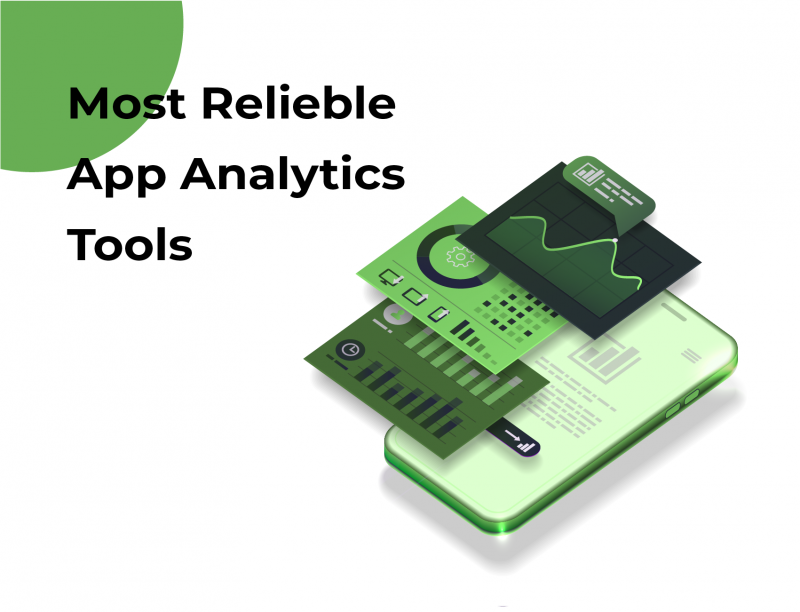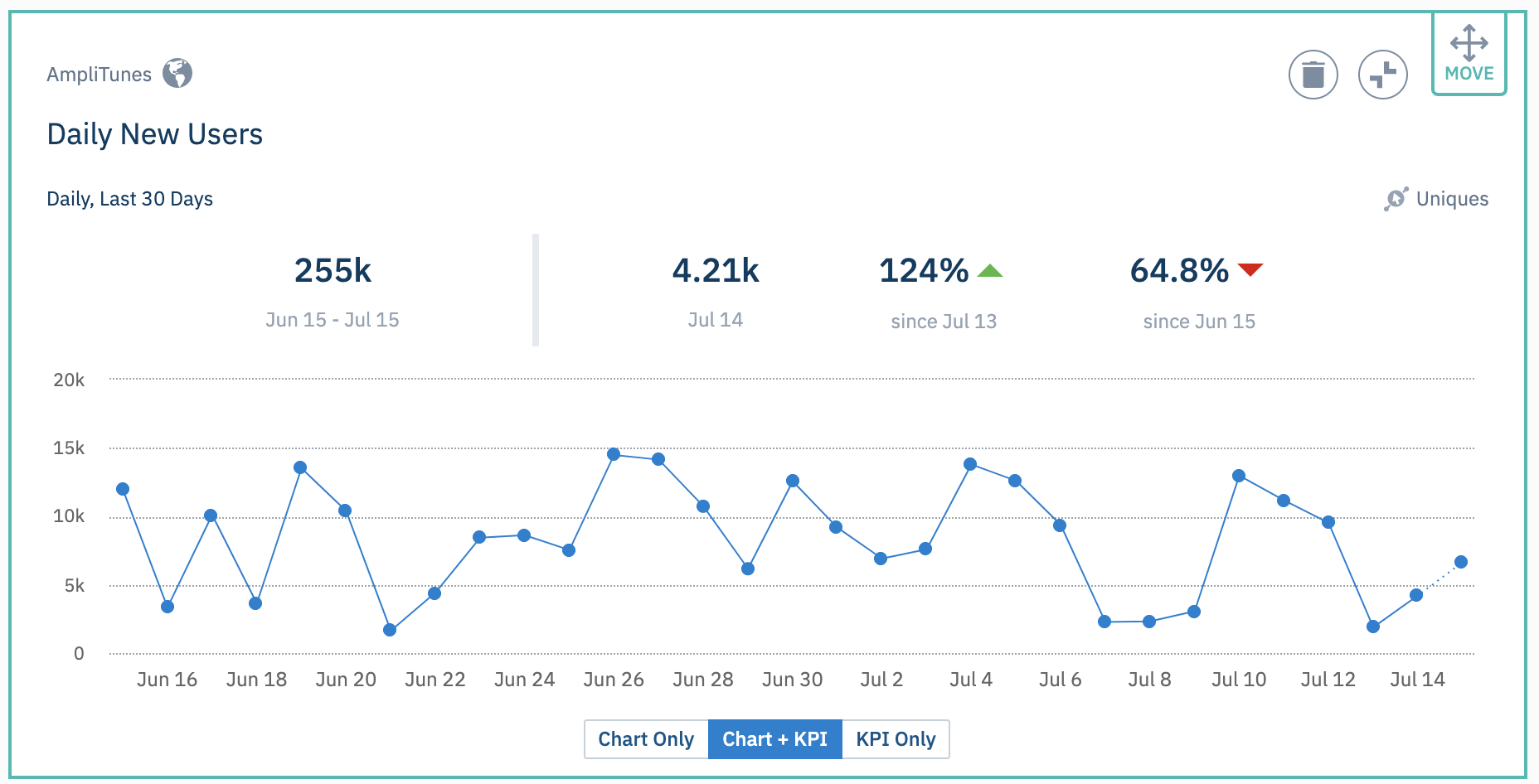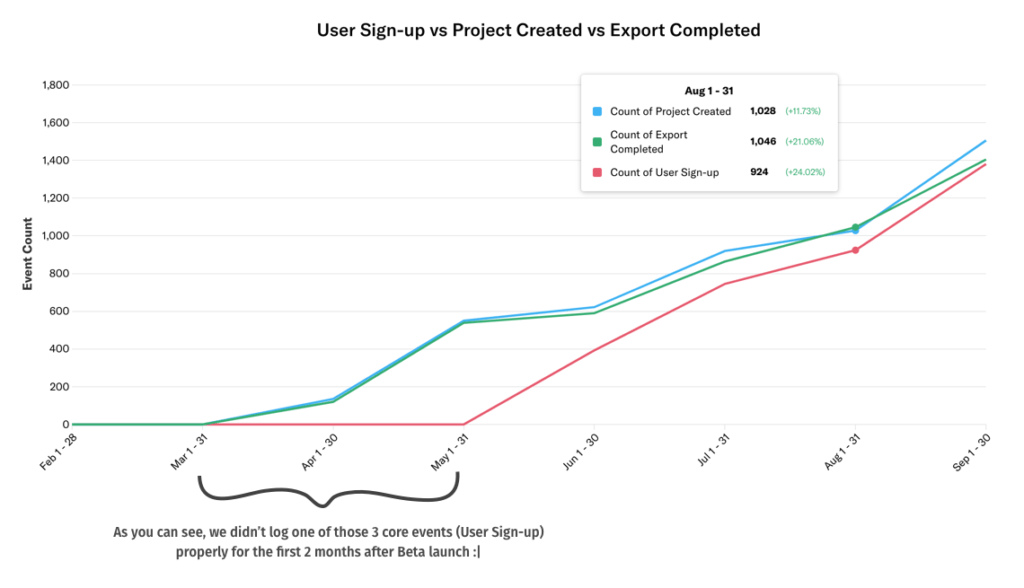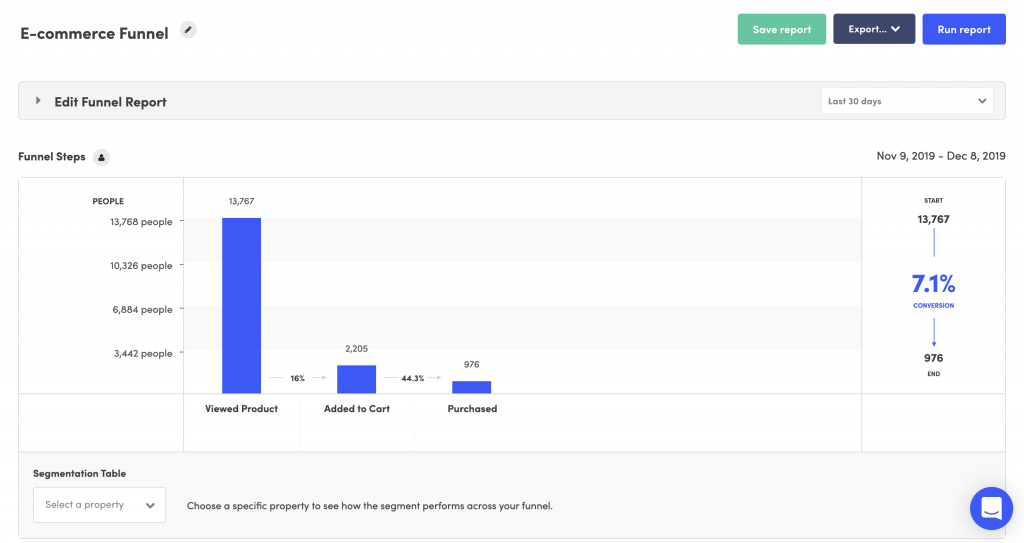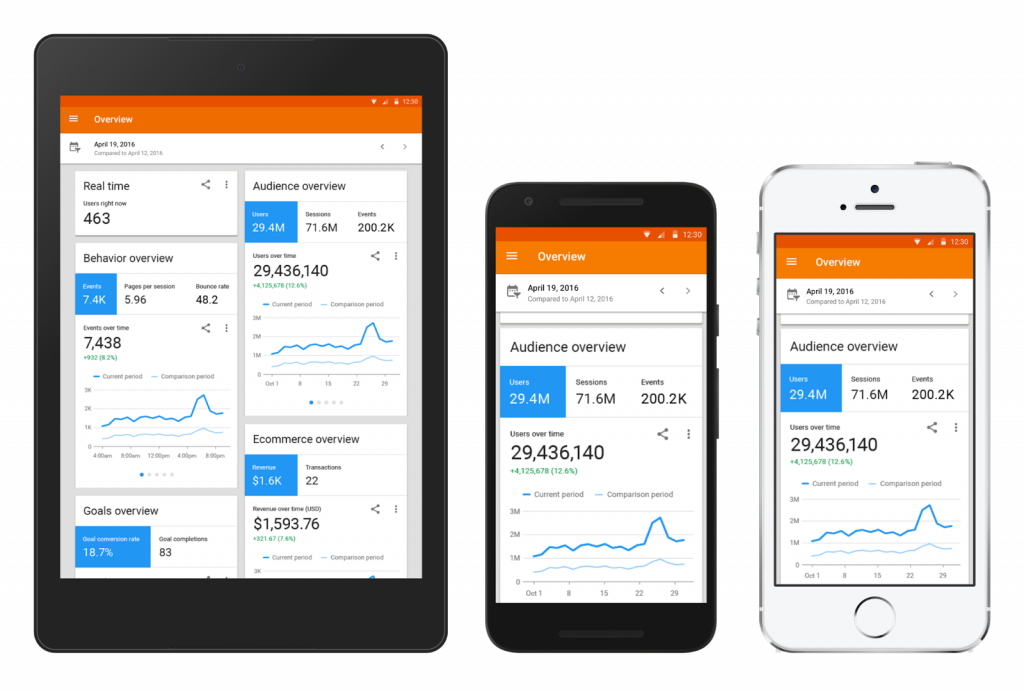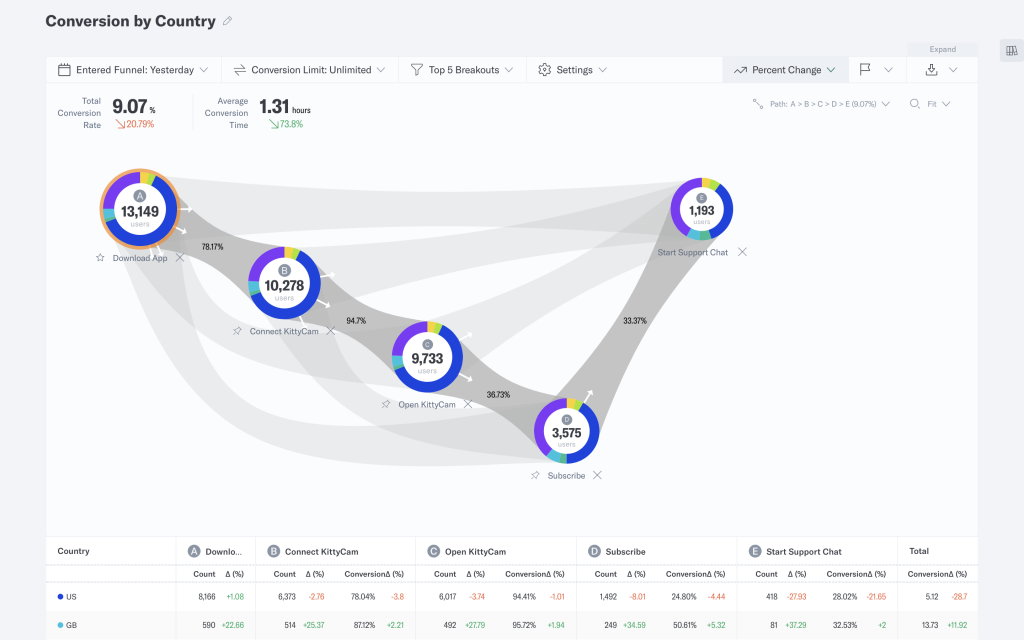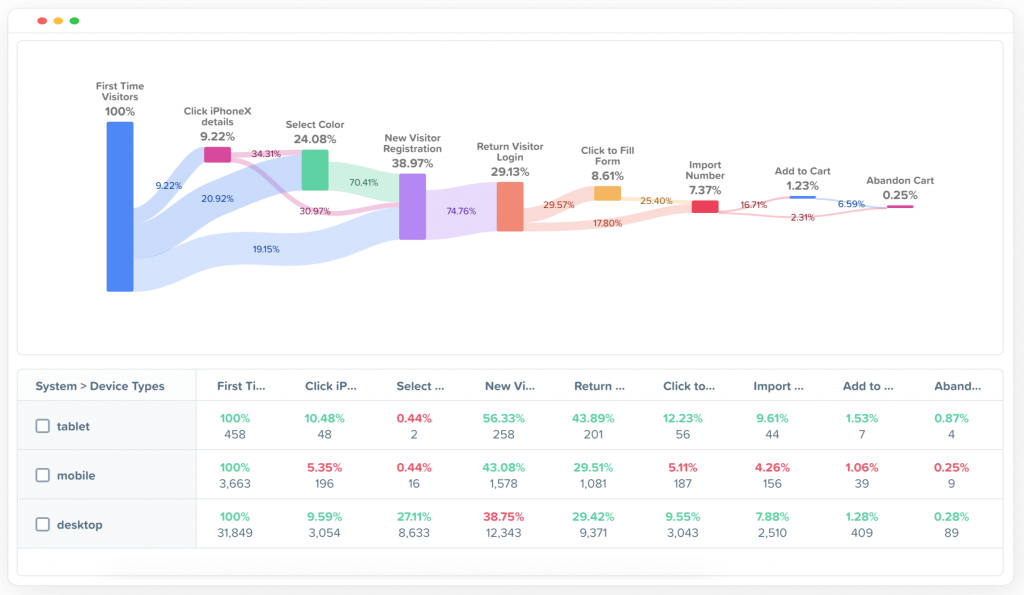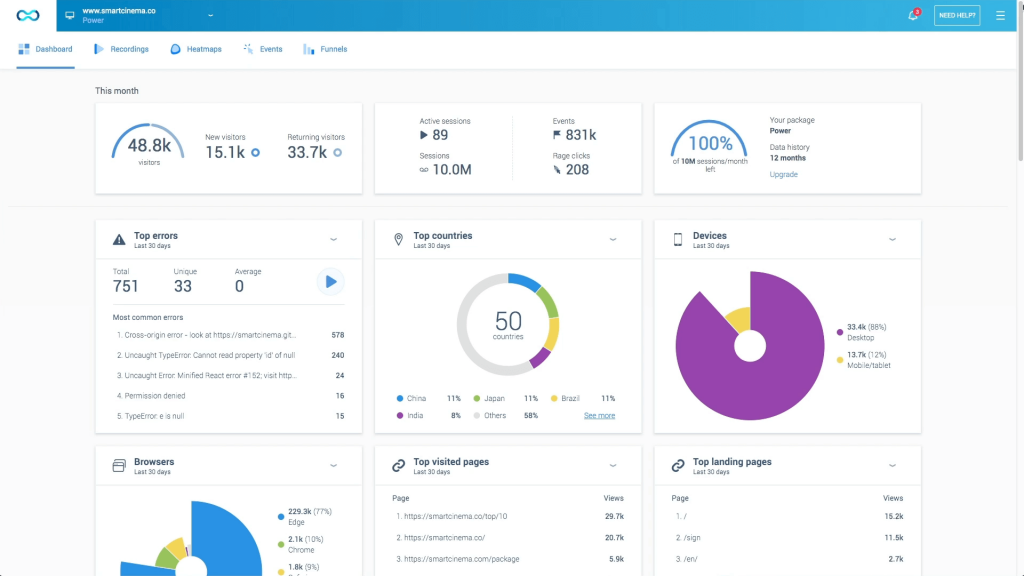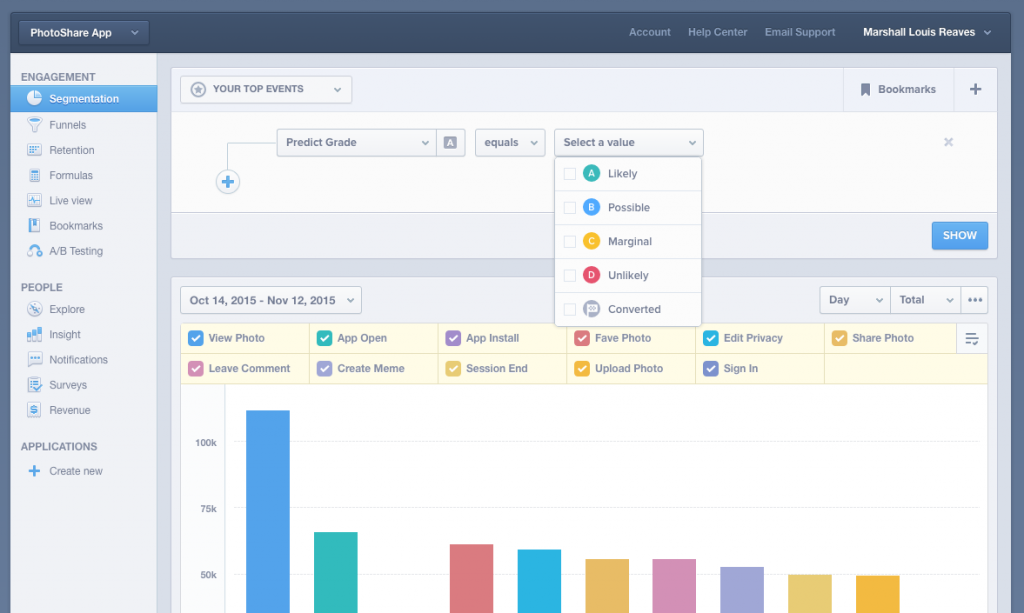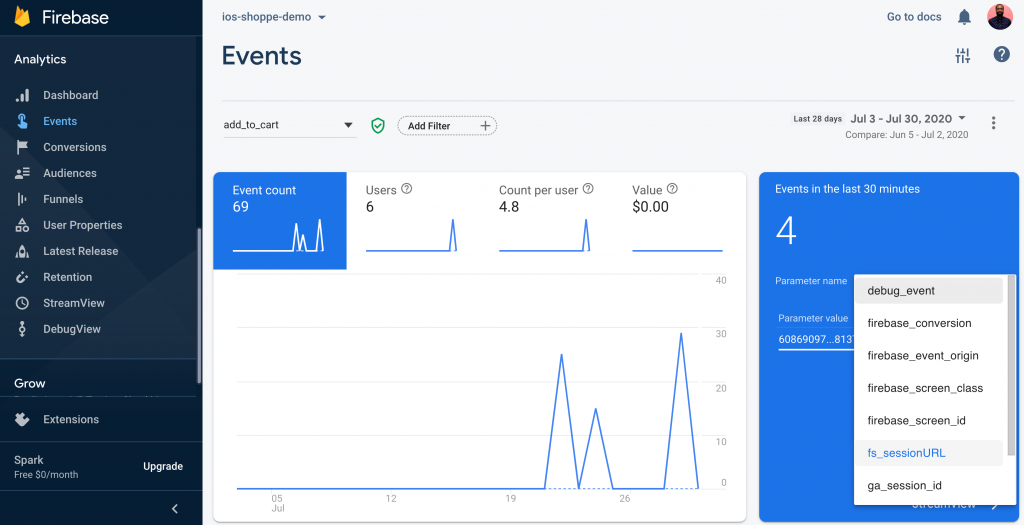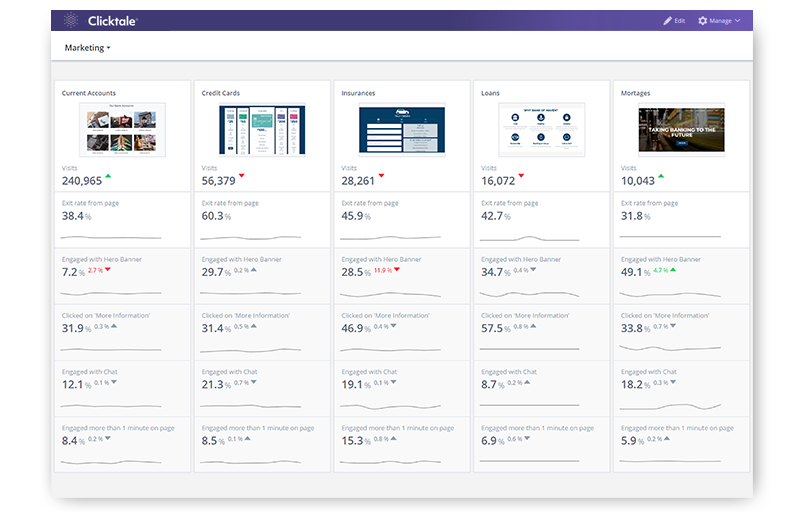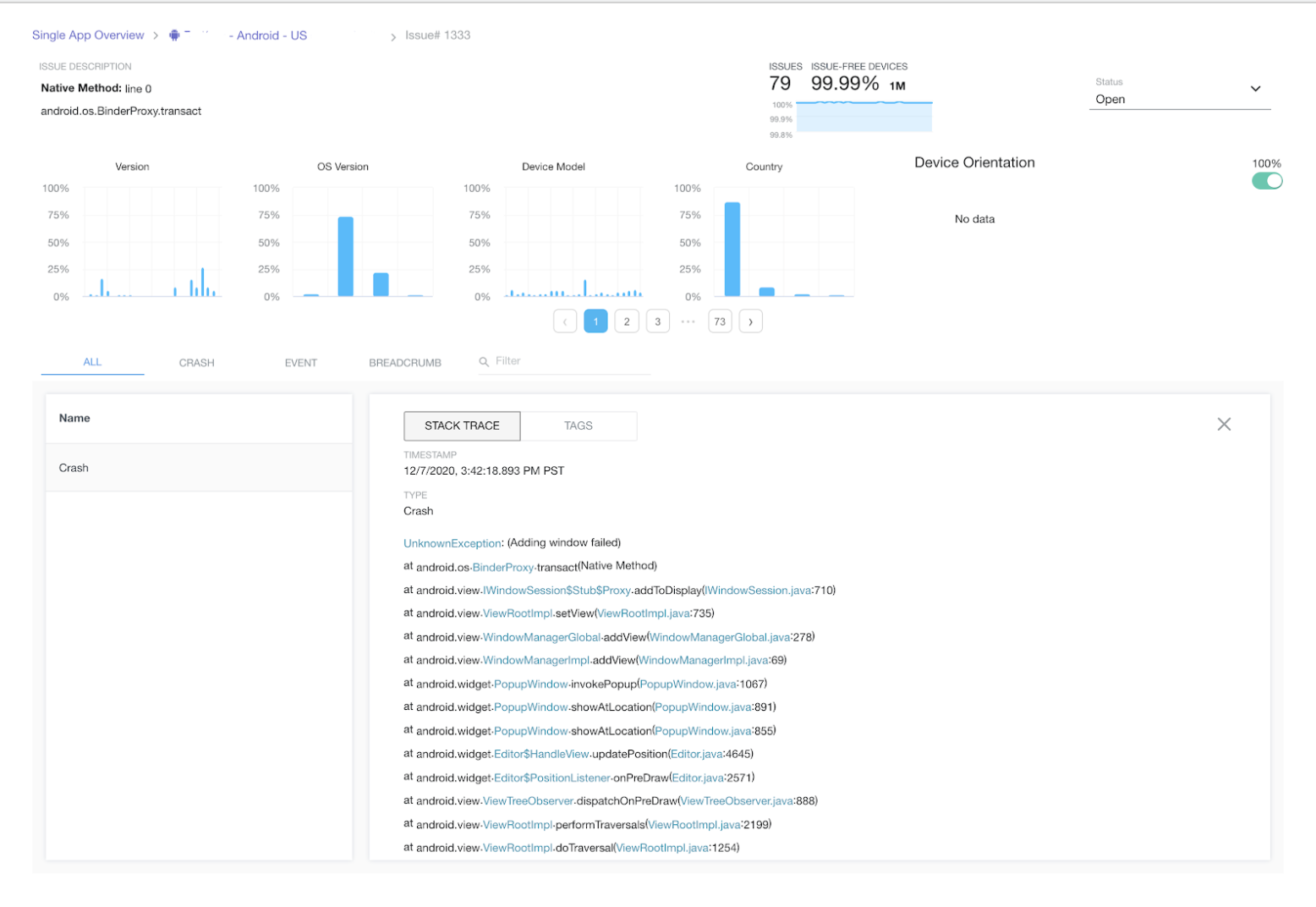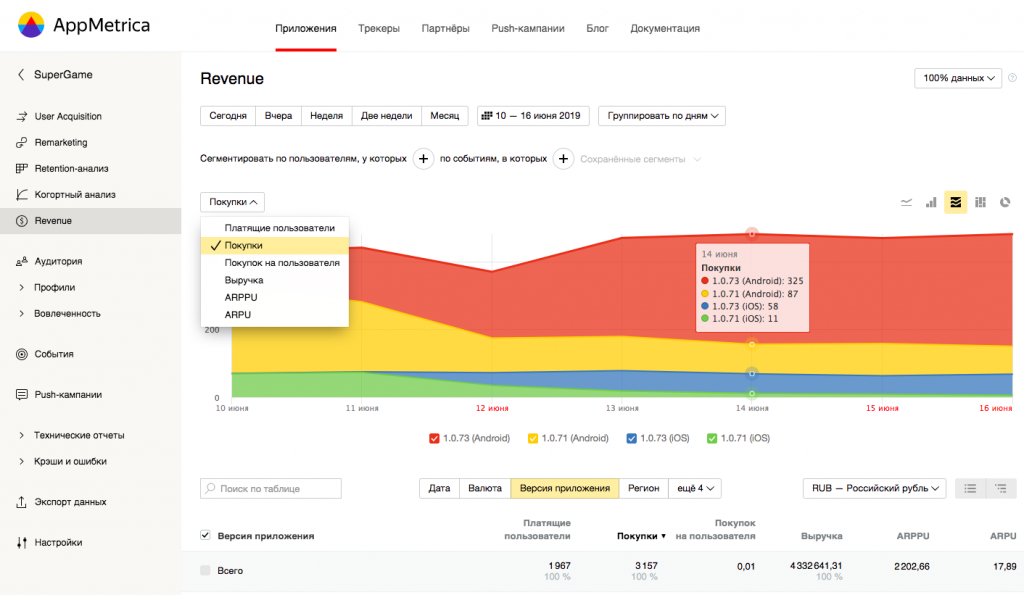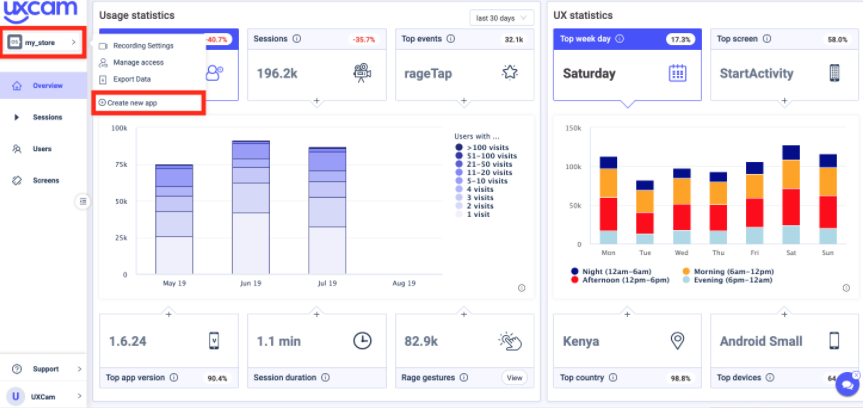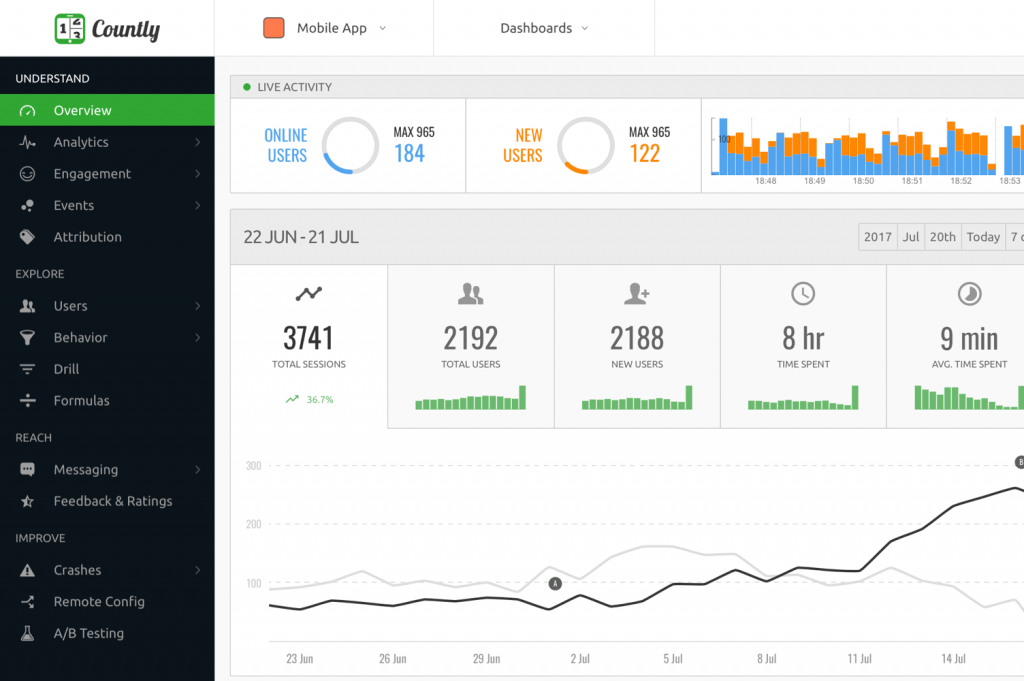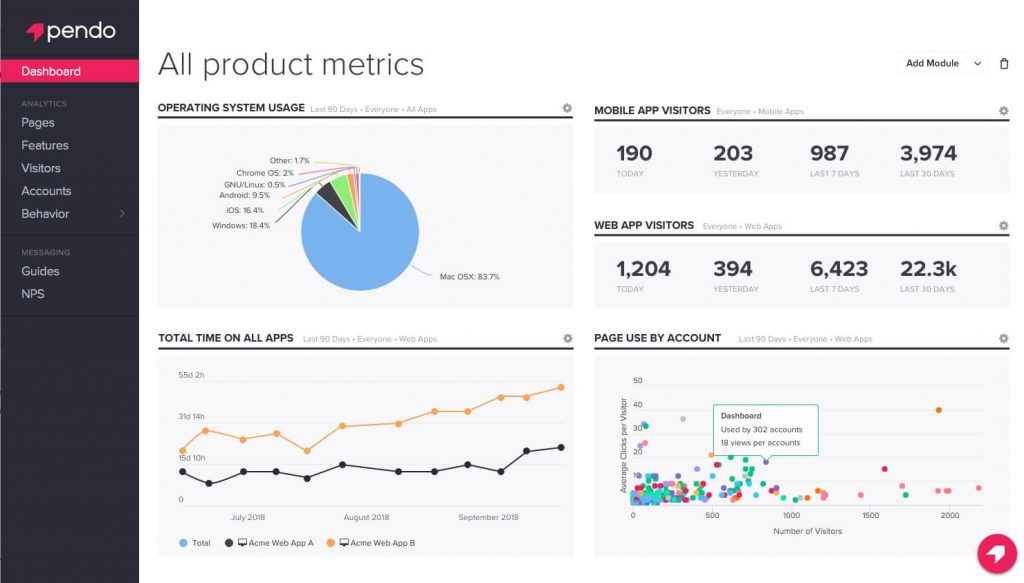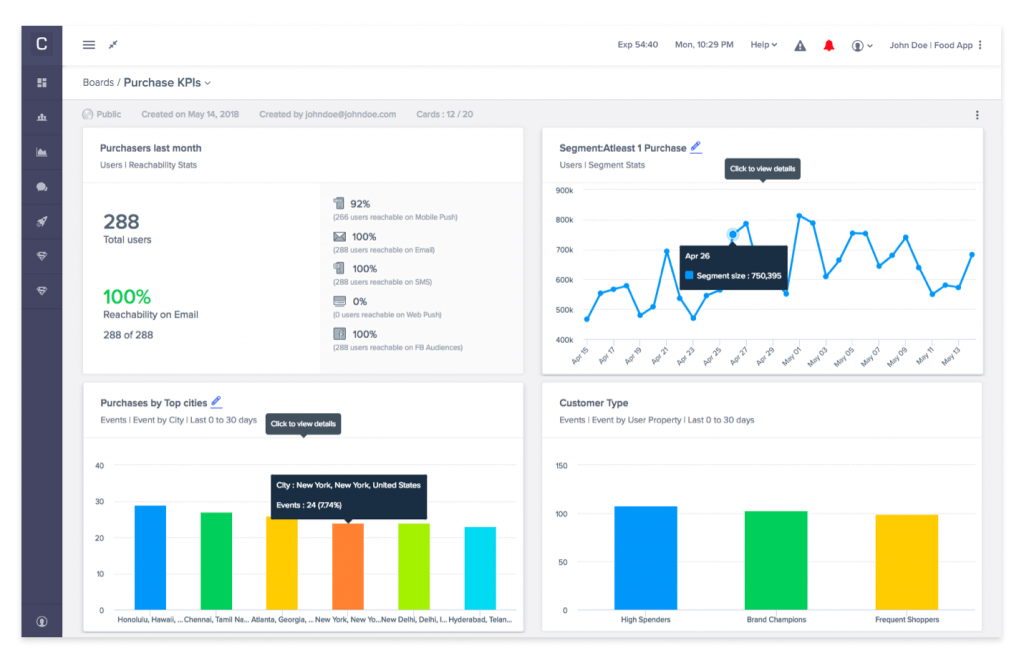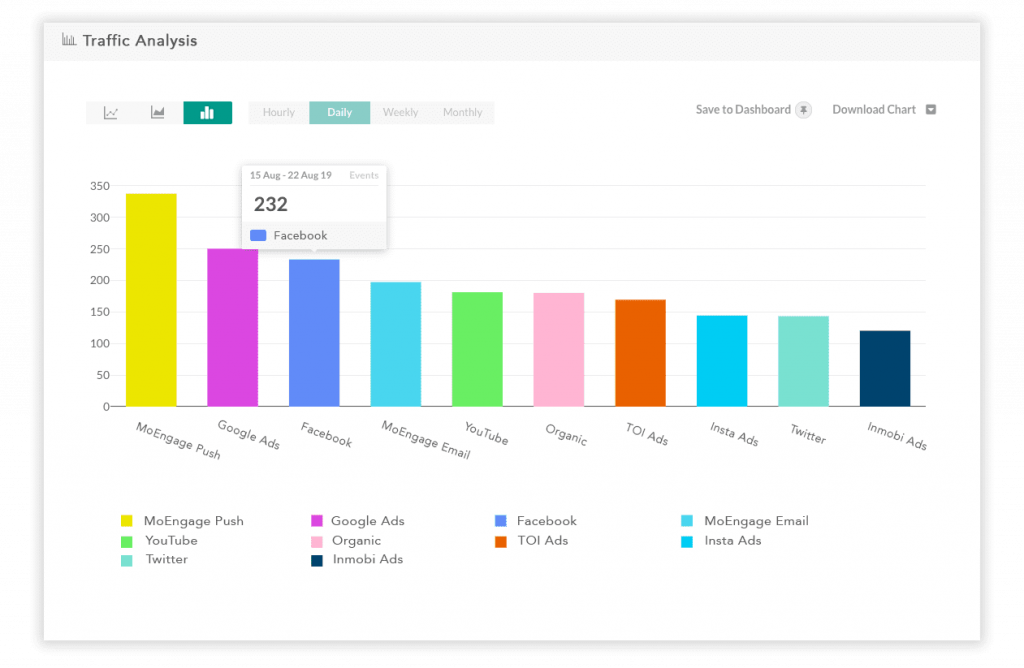If you think that creating an app is a completely won battle, you are most likely mistaken. This is only half of the way. Once the app is finished, you need to understand your users.
What are your clients watching, swiping, and buying? How often do they use your app? For how long do they stay there? The best way to recognize it is to apply a mobile app analytics platform.
When it comes to choosing the best mobile app analytics tools, it can be easy to become overwhelmed (the same as with web analytics software). Nowadays you may find so many vendors on the market. And more are being added every day.
Contents
What is Mobile App Analytics?
Mobile app analytics collect and present the data with useful insights on all platforms. They will help you to reach your goals painlessly. Mobile analytics measures users’ interaction with the application in addition to metrics about the app itself 9for example, app installs, app versions, launches, screens, events, taps, flows, user retention, funnel analysis, etc.)
This post is aimed to show you the importance of modern mobile analytics tools and their vivid advantages. Let’s dive on!
The power of analytics
Starting to measure your data, make sure you do not miss anything important. Analytical data will give you ideas on how to enhance and develop your app and boost loyalty to it. When you get these metrics, you will come up with new insights on what needs to be done to convert potential clients into active application users.
It is also important to get beta testers before your mobile application appears in the app store. This will help you to get your first feedback.
What are the benefits of mobile app analytics?
Why is analytics important for your app? Regardless of how beautiful and useful your app is, without visibility, it may fall short of satisfying your clients’ needs. If it happens, users will look elsewhere to have their needs met.
Paying enough attention to mobile app analytics, you not only equip yourself with the software necessary to better understand your app’s performance, but you also benefit in the following areas:
- Data-driven strategies. The increased access to data will help you to pinpoint specifics that can drive future campaigns. Thanks to the clear visualization of past successes and failures, you will be able to recalibrate your approach with data-driven strategies.
- Real-time ROI assessment. You can enhance the app value and boost ROI by gaining a better understanding of clients through data.
- Personalized strategies. More specific segmenting and targeting your audience will help you to provide them with what they need. App analytics will allow identifying these populations and targeting them with customized strategies.
- Tracking the goals. Mobile app analytics will let you define which acquisition channels are working better. By recognizing these channels, you will be able to dedicate more focus here.
What Are Mobile App Analytics Tools?
Mobile app analytics is a best friend for most developers. Software solutions that analyze the mobile app performance help you gain a good understanding of how your users are behaving and how the app can be optimized to achieve your goals. However, finding an appropriate mobile app analytics tool can be a challenging and sometimes daunting task.
What Are the Types of App Analytics Tools?
Before exploring the best mobile analytics tools, let’s cover some terminology and criteria beforehand. Choosing a suitable app, pay attention to these criteria ahead of time:
 In-app analytics
In-app analytics
In-app tools provide analytics from user behavior within the app. This is about demographics and generally how users interact with your app, for example.
There are two types of in-app analytics: quantitative (that shows what happens) and qualitative (data that explains why it happens). Both metrics serve different purposes, and they’re both helpful.
 Performance and crash data
Performance and crash data
Logically, nobody can use your app if it’s down. Performance and crash data apps provide data on the technical side of your app. This is about load times, crash reports, and session details.
You will need to track crash and performance statistics regardless of what type of app you’re running. All the data in these apps is developer-centric, and understanding crash reports will not essentially help marketers.
 Marketing and install analytics
Marketing and install analytics
Unlike In-app analytics and performance and crash data solutions that measure user interaction and app performance, most marketing analytics tools work outside of the app itself.
You probably strive to find new users and encourage more downloads and advertisements are one of the most common ways to do this. However, first, you will want to look at the data to ensure your marketing campaigns and ad spends are actually generating users and new revenue. This is where marketing and install analytics tools come into play.
What are mobile application examples? What is phone analytics in practical appliances? What is the most profitable app? Now it’s high time to get answers to these questions. Here we gather 13 best mobile analytics tools to help you decide which one is best for your business. Let’s check this mobile app analytics comparison.
Best App Analytics Tools
1. Amplitude
Let’s start with one of the most popular and reliable web and mobile analytics tools with cross-platform user journey tracking, user behavior analysis, and segmentation capabilities.
Amplitude was designed to assist all-sized businesses in finance, electronics, sporting goods, and other industries with retention tracking, user engagement, and more. The tool allows going beyond such metrics as page views and clicks. With its help, you may see every path users take in a single view and zoom in to understand the context and intent behind their actions.
Amplitude does the heavy lifting letting you answer complex product questions like, “Which activities keep users coming back? or “What is the impact of your latest release?”
Amplitude’s main features are:
- Mobile apps analysis
- Channel attribution
- A/B testing
- Funnel analysis
- Cohort analysis
- Retention tracking
- In-app events tracking
- Revenue tracking
- Push notifications, etc.
Pricing:
- Free version available
- Plans are not provided
Take a look at how Amplitude works in this video tutorial:
| Pros | Cons |
|
|
2. Heap
Heap pulls in data from different kinds of sources and allows analyzing them all at once. This mobile app analytics platform lets you quickly check on user interactions, mobile app performance, and customer journeys, and make adjustments accordingly.
Heap helps teams to make better decisions. It automatically captures every user action on a website or mobile application, letting you analyze the usage patterns that drive conversion and retention. Heap offers a unique approach to analytics by capturing all user interactions and analyzing them without the need to ship code or wait for data.
Heap’s main features are:
- Channel attribution
- Customer journey mapping
- Dashboard
- Social media metrics
- Campaign tracking
- Channel attribution, etc.
Pricing:
- Free trial and free version available
- Price varies depending on your needs.
Take a look at how Heap works in this video tutorial:
| Pros | Cons |
|
|
3. Kissmetrics
Another reliable mobile analytics tool that provides advanced insights to segment visitors into groups that can be easily tracked.
Kissmetrics preaches the principle that data isn’t just a set of numbers you place into a graph. Each number represents a user, a client, or a significant action that contributes to your core marketing metrics and your business growth. With its help, you will be able to get up-to-date user behavior info and reports from your groups, without your extra efforts.
Useful integrations with popular social media will allow you to target your audience more accurately. You will also be able to import your shopping history and track customer data use on your site.
Kissmetrics’s main features are:
- A/B testing
- Dashboard
- Campaign tracking
- ROI tracking
- Channel attribution
- Customer journey mapping
- Performance metrics
- Predictive analytics for apps
- Social media metrics, etc.
Pricing:
- Customized pricing plans only
Take a look at how Kissmetrics works in this video tutorial:
| Pros | Cons |
|
|
4. Google Analytics
Google mobile app analytics is one of the best examples of free apps analysis solutions. Many users all over the world still don’t realize that this platform also has a feature for mobile apps as well, both on Android and iOS.
GA is easy to learn for experienced GA users. It offers integration with Google Play for conversion tracking.
Google Analytics also has a premium version designed specifically for enterprises and provides information that is more detailed. It doesn’t matter the size of your market, how many mobile apps downloads and traffic you generate, this free tool can help you track performance seamlessly.
GA’s main features are:
- Filters
- Calculated metrics
- Campaign tracking
- Channel grouping
- Event tracking
- Segments
- Custom metrics
- Real-time reporting
- Integrations
- Custom reports
- Annotations
- Custom alerts
- Analytics intelligence
- Shortcuts, etc.
Pricing:
- No free trial
- Free (with paid options for the Google Analytics 360)
Take a look at how Google Analytics works in this video tutorial:
| Pros | Cons |
|
|
5. Indicative
This is a free app analytics tool designed to assist businesses in optimizing their operations.
Indicative links to customer data sources and combines them into a clear overview of customer manners. It also offers actionable intelligence to enable companies to expand. Product managers, marketers, and business analysts all over the world use this analytics app to optimize customer conversion, engagement, and retention. The platform understands that customers do not take one straight path to conversion, so the app has features that let businesses follow the same routes as their customers take for a deeper knowledge of customer behavior.
Indicative’s main features are:
- Benchmarking
- Ad hoc reports
- Key performance indicators
- Performance metrics
- Profitability analysis
- Publishing/sharing
- Scorecards
- Strategic planning
- Problem indicators
- Visual analytics, etc.
Pricing:
- Free version and free trial available
- Starts at $950 monthly
Take a look at how Indicative works in this video tutorial:
| Pros | Cons |
|
|
6. Woopra
Woopra positions itself as clear statistics on the customer journey, broken down and ready for actionable changes and improvements. The tool works across a variety of platforms, including mobile apps, to bring customer data into one streamlined interface.
Woopra offers more than 50 one-click integrations with such famous partners as Intercom, Salesforce, Marketo, Segment, and others to seamlessly unify disparate data points across tools and teams. Woopra’s Triggers let teams take real-time action on their data.
Woopra’s main features are:
- Advanced mobile app analysis
- Customer segmentation
- Dashboard
- Multi-channel data collection
- Predictive analytics
- Text analysis
Pricing:
- Free trial and free version available.
- Starts at $999 monthly.
Take a look at how Woopra works in this video tutorial:
| Pros | Cons |
|
|
7. Smartlook
Smartlook is a powerful mobile analytics tool that offers recordings to identify the customers, funnels to discover why visitors don’t take the next step, and a customizable dashboard to easily analyze the data.
Its features (such as event logging and session recording) can demonstrate how your mobile app behaves. It will help you to understand your customers’ online behavior on your website and mobile app.
Always-on visitor recordings will show you what every last visitor does on your app, and automatic event tracking will let you know how your visitors do specific things. The platform integrates with several well-known platforms like Slack or iOS.
Smartlook’s main features are:
- Campaign tracking
- Customer journey mapping
- Dashboard
- Performance metrics
- Website and mobile apps analytics, etc.
Pricing:
- Free version and free trial available
- Starts at $31 monthly
Take a look at how Smartlook works in this video tutorial:
| Pros | Cons |
|
|
8. Mixpanel
Mixpanel is web analytics software that also has mobile app components. It’s designed to be simple to use, yet fully-featured unlike many of its simplified rivals. With the Enterprise plan, you can predict users who will most likely convert before they do.
MixPanel offers a funnel analysis and its uniquely-titled engagement tracker, the Addiction report. These tools allow a better understanding of which strategies increase conversion, retention, and engagement. MixPanel comes with interactive reports so you can pull data quickly and easily. This interactive feature provides answers to all of your audience engagement questions in seconds.
Mixpanel’s main features are:
- Campaign management
- Conversion tracking
- Goal tracking
- Pageview tracking
- User interaction tracking
- Referral source tracking, etc.
Pricing:
- Free version and free trial available
- Starts at $17 monthly
Take a look at how Mixpanel works in this video tutorial:
| Pros | Cons |
|
|
9. Fullstory
This digital experience platform helps companies to continuously improve the digital customer experience across mobile apps and sites. At the core of FullStory’s platform is a powerful analytics engine that connects digital interactions to the metrics that matter most to businesses.
The tool offers top opportunities to optimize digital experience, enabling teams to understand issues, prioritize fixes, remediate bugs, and measure the impact of those changes. It can empower everyone in an organization to help build the best online experience.
Fullstory’s main features are:
- Alerts/notifications
- Event logs
- Performance metrics
- Real-time monitoring
- Transaction monitoring, etc.
Pricing:
- Free trial available
- No free version
- Price varies depending on your needs.
Take a look at how Fullstory works in this video tutorial:
| Pros | Cons |
|
|
10. Clicktale
Clicktale shows user behavior and customer journey data. You’ll get qualitative and quantitative data through Clicktale, including heatmaps and funnel tracking. The tool integrates with websites and mobile apps.
Clicktale provides visibility into customer behavior and decision-making by tracking their every action inside an app. It will help you to boost conversions and engagement, align internal teams with easily-consumable visualizations, identify opportunities, drill into errors and prioritize tasks based on business impact, elevate the testing culture by pinpointing areas for examination, and creating tests based on data, rather than guesswork.
Clicktale’s main features are:
- Customer segmentation
- Dashboard
- Multi-channel data collection
- Predictive analytics
- Sentiment analysis
- Survey/poll management
- Text analysics
Pricing:
- No free version
- Free trial available
- Price varies depending on your needs.
Take a look at how Clicktale works in this video tutorial:
| Pros | Cons |
|
|
11. Flurry
Flurry Analytics is one of the world’s most recognized mobile app analytics software. It’s free and easy to use. Designed to help product, development, and growth experts build apps users’ love, Flurry helps to boost app engagement, run a data-driven product roadmap, and accelerate user acquisition efforts. The tool also includes crash reporting, push notification management, and remote configuration.
Flurry also delivers on-demand, fast querying for easy slice-and-dice to explore and segment your audience like never before. You can view metrics by groups of apps or individually, and even compare iOS versus Android versions of your app side by side.
Flurry’s main features are:
- Real-time metrics
- Focused dashboards
- Revenue analytics
- Crash analytics
- Analytics reporting API
- Filtering of data
- Groups, etc.
Pricing:
- Free
Take a look at how Flurry wroks in this video tutorial:
| Pros | Cons |
|
|
12. AppMetrica
AppMetrica is a free platform that includes mobile analytics, install attribution, bug reporting, and push notifications. This tool is designed for tracking mobile apps on Android, iOS, Windows, Xamarin, Unity, and Cordova. To get started, you need to register on Yandex.
The tool is intended for mobile developers as it can be used to monitor download statistics and receive error messages. Marketers will benefit from the functions of cohort analysis, attribution control, and audience segmentation.
Appmetrica’s main features are:
- Advanced Android and iOS app analytics
- Cohort analysis
- Audience segmentation
- Collecting bug reports
- Configuring and tracking events
- Audience activity
- Location information and demographics
- Technical reports
- Pop-up notifications, etc.
Pricing:
- Free
Take a look at how AppMetrica works in this video tutorial:
| Pros | Cons |
|
|
13. UXCam
UXCam is a mobile app testing and analytics tool designed for application developers. This analytical solution aloows users to view recordings of user sessions, which can help them identify the causes behind an app crash or bug.
The tool can also help out with the user onboarding process.
Most companies track page visits and do not capture micro-interaction data sets. They completely miss what matters – the user. UXCam helps people to deliver the perfect app, by understanding their users.
UXCam’s main features are:
- For Mobile
- Heatmaps
- Screen Activity Recording
- Usability Testing
- User Journeys
- User Research
Pricing:
- Free version and free trial available
Take a look at how UXCam works in this video tutorial:
| Pros | Cons |
|
|
What Are the Best Analytics Tools? Summary of the Most Reliable Analytics Platforms for Mobile Apps
| App | Free version | Free trial | Cost |
| Amplitude | yes | yes | not provided |
| Heap | yes | yes | not provided |
| Kissmetrics | no | yes | starts at $299 |
| Google Analytics | yes | no | free |
| Indicative | yes | yes | starts at $950 |
| Woopra | yes | yes | starts at $999 |
| Smartlook | yes | yes | starts at $31 |
| Mixpanel | yes | yes | starts at $17 |
| Fullstory | no | yes | not provided |
| Clicktale | no | yes | not provided |
| Flurry | yes | yes | free |
| AppMetrica | not provided | not provided | not provided |
| UXCom | yes | not provided | not provided |
Bonus  Advanced Analytics + Customer Engagement Tools
Advanced Analytics + Customer Engagement Tools
14. Countly
Countly is product analytics software that helps teams track product performance and customer journey across web, mobile, and desktop apps. It allows innovating and enhancing your products to provide personalized and customized customer experiences. Countly can empower businesses to grow by helping them securely process billions of data points every day in the cloud and on-premise.
Pricing:
- Free version and free trial available
- Starts at $750 monthly
Take a look at how Countly works in this video tutorial:
| Pros | Cons |
|
|
15. Pendo
Pendo is an app analytics solution that helps software product teams deliver products users love. Using its insights, you can set up in-app messages, guides, and walkthroughs without any coding to help users get the most value from your products.
Pricing:
- Free trial and free version available
- Price varies depending on your needs
Take a look at how Pendo works in this video tutorial:
| Pros | Cons |
|
|
16. CleverTap
CleverTap serves mobile-first businesses to retain their mobile users by leveraging real-time analytics and individualized engagement strategies at scale. It’s push notifications allow you to reach users that are currently not in your app.
Pricing:
- Free version and free trial available
- Starts at $311
Take a look at how CleverTap works in this video tutorial:
| Pros | Cons |
|
|
17. Moengage
MoEngage is an intelligent customer engagement platform for the customer-obsessed marketer. It is aimed to delight your customers and retain them for longer. With this tool, you will be able to analyze customer behavior and engage them with personalized communication across the web, mobile, and email.
Pricing:
- Free version and free trial available
- Starts at $999 monthly
Take a look at how Moengage works in this video tutorial:
| Pros | Cons |
|
|
Conclusion
That wraps it up. However, the list of the best mobile app analytics comparison we have provided is certainly not complete. You can confidently add your variants to it (but do not forget to share them with us in the comments!)
Whether you’re looking to improve your current app, optimizing your launch strategy, or just in the brainstorming stage, there’s a powerful solution out there right for you.
Some analytics software solutions provide discounts for yearly billing, many of them offer free versions. Dive deeply into their features and choose the perfect fit!
FAQ
What is mobile app analytics?
Analytics is about measuring and analyzing data of users in order to create an understanding of user behavior, website, or app’s performance. Mobile analytics measures users’ interaction with the application in addition to metrics about the app itself 9for example, app installs, app versions, launches, screens, events, taps, flows, user retention, funnel analysis, etc.)
What is phone analytics?
Phone analytics lets you measure the efficiency of phone calls as part of the conversion path. To implement it, you should set the necessary options for your analytics property, and add a snippet to your analytics tracking code on each page where your phone number appears.
How do I track mobile analytics?
Use powerful mobile analytics tools, such as Amplitude, Kissmetrics, Google Analytics, Flurry, Clicktale, or others.
How do you analyze an app?
To analyze the performance of a mobile app, you may use the following metrics: tech-related metrics (app crashes, API latency, apps speed, etc.), user engagement metrics (number of events, number of installs, retention rate, etc.), and business-related metrics (acquisition cost, lifetime value, or ARPU).
What is Amplitude app?
Amplitude is one of the most popular web and mobile analytics tools with cross-platform user journey tracking, user behavior analysis, and segmentation capabilities. With its help, you may see every path users take in a single view and zoom in to understand the context and intent behind their actions.
What is impressions in app analytics?
Impressions are the number of times your app has shown up on the app store.
Can you use Google Analytics for apps?
Yes, GA is available for mobile applications.
What is the most profitable app?
It depends on the type of your app, your audience, and other factors.
*pictures used are from pexels.com and unsplash.com (K.Burak, Lukas, E. Pratama, G. de Lotz)





